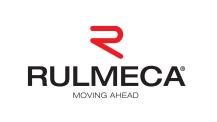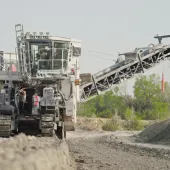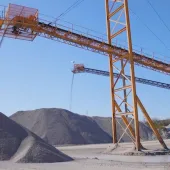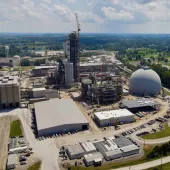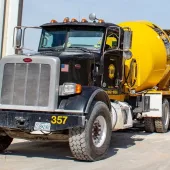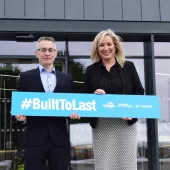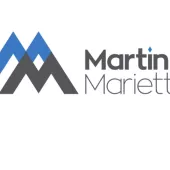Crushing on the run with Powerscreen
Danny and Sue Conyers founded Conyers Concrete and Asphalt Services, Inc in 1976. Danny, who is president of the company, also worked until recently in on-site crushing operations; Sue is the owner and office manager. Their two sons, Josh and Scott, run a four-man operation that crushes concrete and asphalt, in southern Georgia, Alabama and Florida. An additional four-man crew crushes asphalt only, mostly in and around Birmingham.
Conyers started out doing grading and landscape work. But they quit that business about 11 years ago when they saw some recycling opportunities. ‘We jumped in with both feet,’ Danny Conyers explained. ‘We figured we work hard, we’re honest, we know how to run a business, and we have a good reputation. So we were confident we could switch to recycling and be successful. Problem was we didn’t know much about crushing and screening equipment, and we didn’t have the expertise our experienced competitors had. But we found both in Powerscreen of Florida and their representative, Ken Furey.
Danny explained: ‘We had heard good things about them so we got in touch. Ken sold us on Powerscreen’s quality, performance and value. And he and others at the dealership got us started with a lot of very good advice and direction. We still count on them for counsel on recycling operations. It’s almost like we’re in partnership with them. They take care of us.
‘When we need something—parts or service—we get it pronto,’ said Scott Conyers. ‘Call in a parts order, for example, by mid-day, and it will be delivered the next morning, no exceptions, no excuses. A number of times, Ken Furey has driven parts to us by special delivery in his pickup truck—sometimes after hours or whenever we need it. And the Powerscreen of Florida service team or field engineers we might need are here on the double, too. You need great equipment and a great dealer. One without the other just doesn’t make it.’
The concrete/asphalt crushing operation utilizes a Terex Pegson 4242SR impact crusher, a Powerscreen Premiertrak 400 jaw crusher, Powerscreen Warrior 1800 screen plant, and a Powerscreen radial stacker. The impactor is used exclusively for asphalt; the jaw exclusively for concrete. The Warrior screen is used for both.
The asphalt crushing operation utilizes a Powerscreen Trakpactor 320SR impactor, a Warrior 1800 screen, and two Powerscreen radial stackers.
‘We run our equipment hard,’ said Scott. ‘But we take very good care of it. Service on the Powerscreen machines is pretty quick and simple, but you have to be diligent about it; and we are. So when we trade-in a machine, Ken Furey is able to give us a great deal on a new machine. And whoever buys it from him gets good value, too.’
He added: ‘We’ve never worn out a Powerscreen machine. If we trade it in, it’s because our needs change or Powerscreen comes out with a new model that better suits our needs. We traded in a Chieftain 1400 and a Chieftain 2100 [screen] that were in great shape, for example, and somebody got a good used buy on them both.’
‘When you’re on the go as much as we are,’ Josh Conyers explained, ‘you need efficient crushers and screens that are highly mobile. Currently we’re at a site where we’re crushing asphalt only—about 20,000 tons total—and that will take two and a half, five-day weeks, including downtime for refuelling, checking and cleaning equipment, maintenance of all equipment, lunch breaks, moving equipment on site, and so on. Actual production time averages 250 to 300 tons/h for either concrete or asphalt, including material scalped off top, crushed, stacked and loaded.’
Shut-downs and start-ups are quick and simple, according to Josh: about four hours or less, plus travel time. Recently Josh and Scott shut down on one job at 11am, hosed off the equipment, ran it onto a couple low-boy trailers, drove a short distance to another site, were running by 3 pm, and crushed 670 tons before quitting time.
Scott pointed out: ‘That’s how efficient we have to be—in production and moving—in order to be competitive and still make an acceptable profit—especially on smaller jobs. We’ll go to a site for as little as 10,000 tons of concrete or asphalt. Some jobs involve both materials. An average job is 20,000-30,000 tons. Large jobs are 50,000 or more.’
Josh added: ‘Over the years we’ve been on jobs where some other company is crushing nearby. We see that their equipment doesn’t always work as well as ours, and they don’t always get the great parts and repair service we get. You just can’t live with profit killers like inefficiency and unplanned downtime. Sometimes you call a supplier and leave a message. These messages aren’t always returned. We never have that problem with Powerscreen.’
The Warrior 1800 is a high-volume unit built for tough, high-capacity dry screening, three-way splitting, and stockpiling. It sets up on site in 20 minutes or less and screens up to 700 tons/h. It has heavy-duty impact bars instead of rollers in key areas and a wear-resistant steel hopper with hydraulic folding sides. The hopper exit opening is 4ft wide.
The 4242SR horizontal impact crusher includes a screen and stockpiling conveyor with magnetic separator. It features a 428 fixed-hammer impactor, 42in x 28in feed opening, 42in rotor width and 42in rotor diameter (over hammers), and is suitable for primary or secondary applications with concrete and asphalt rubble, demolition debris, and aggregates. The unit can be set up and operating within 10 minutes of arrival on site and can produce up to 396 tons/h, depending on feed material and finished product size.
The Premiertrak 400 primary jaw plant is designed for medium-scale operators in recycling, demolition, quarrying, and mining. Features include: up to 440 tons/h, hydraulic folding feed hopper with boltless fixing system, hydraulic tilting conveyor system, efficient direct drive, high-swing jaw, height-adjustable product conveyor, hydraulic folding extended hopper.
The Trakpactor 320SR is a mid-sized horizontal impact crusher with excellent reduction and high consistency of product shape for recycling, C&D, and quarrying. It is suited to medium-hard, mildly abrasive materials. Features include: direct drive, up to 350 tons/h, bolt-in cartridge grizzly feeder with 42mm nominal spacing, load management system to control feeder speed, hydraulic overload protection, four-bar rotor (two full, two half), twin apron, and PLC control of crusher speed.

